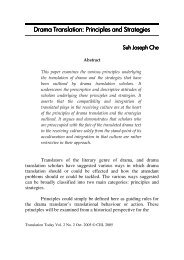Re-Evaluation of Lin Shu (the Chinese Translator) - National ...
Re-Evaluation of Lin Shu (the Chinese Translator) - National ...
Re-Evaluation of Lin Shu (the Chinese Translator) - National ...
Create successful ePaper yourself
Turn your PDF publications into a flip-book with our unique Google optimized e-Paper software.
Xu Jianzhong 157manipulated <strong>the</strong> original according to <strong>the</strong> <strong>Chinese</strong> readers’ demandsand expectations. He let foreign writers approach <strong>Chinese</strong> readers.As a result, he used <strong>the</strong> domesticating method in translation.Once a text functions as a tool <strong>of</strong> ideology, its significancecan be distorted so freely that readers can accept <strong>the</strong> ideology <strong>of</strong> <strong>the</strong>author or <strong>the</strong> translator. The historic context <strong>of</strong> <strong>the</strong> text is ignoredand <strong>the</strong> intention <strong>of</strong> <strong>the</strong> author is not considered as <strong>the</strong> central point.The Role <strong>of</strong> Patronage in <strong>the</strong> Shaping <strong>of</strong> <strong>Lin</strong> <strong>Shu</strong>’s TranslationPatronage is <strong>the</strong> most important among <strong>the</strong> three elementsaccording to Lefevere’s systemic <strong>the</strong>ory (Yang Liu, 2001: 49).Lefevere regards ideology and patronage as <strong>the</strong> two factors thatgovern a literary system from <strong>the</strong> outside to ensure that “<strong>the</strong> literarysystem does not fall too far out <strong>of</strong> step with <strong>the</strong> o<strong>the</strong>r subsystemssociety consists <strong>of</strong>.”(<strong>Shu</strong>ttleworth & Cowie, 2004: 123). Lefeveredefines patronage as “something like <strong>the</strong> powers (persons,institutions) that can fur<strong>the</strong>r or hinder <strong>the</strong> reading, writing, andrewriting <strong>of</strong> literature” (Lefevere, 2004: 15).Patronage consists <strong>of</strong> three components, among which“ideological constraints on form and subject matter, economicprovision for writers, translators and o<strong>the</strong>r REWRITERS, and <strong>the</strong>bestowing <strong>of</strong> status on <strong>the</strong>se individuals”(<strong>Shu</strong>ttleworth & Cowie,2004: 123). Among <strong>the</strong> three ones, ideology is <strong>the</strong> primary concern<strong>of</strong> patronage.Before <strong>the</strong> late Qing Dynasty, fiction had been on <strong>the</strong>periphery <strong>of</strong> <strong>Chinese</strong> literary system. Just at <strong>the</strong> turn <strong>of</strong> <strong>the</strong> twentiethcentury, fiction assumed <strong>the</strong> central position and attracted <strong>the</strong>populace’s attention. Capitalist reformists are <strong>the</strong> important patrons<strong>of</strong> fictional translation in China. They admitted fiction to be <strong>the</strong>canon <strong>of</strong> <strong>Chinese</strong> literary system. And fictional translation as ameans <strong>of</strong> national salvation and mass enlightenment, was flourishing
















